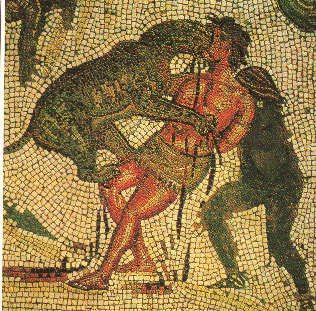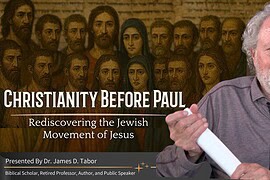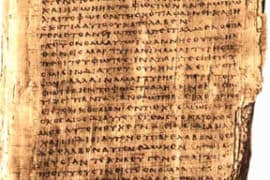Given my chosen field of study, namely “Christian Origins,” I am often asked by students and attendees at my lectures whether there are any reference to Jesus and the early “Christian” movement outsidethe New Testament. The following references, from a diverse collection of Roman writers around the time of the Emperor Trajan (98-117 CE), are quite fascinating–as much for the dismissive and disdainfulattitudes toward emerging Christianity they reflect as the insights they provide into the movement itself. [1]For a full treatment and discussion see the book by Robert Wilken, The Christians as the Romans Saw Them(Yale University Press, 1986). I encourage my students, first and foremost, to read their primary sources, so I wanted to provide my blog readers with some of the texts we regularly study in my Christian Origins class.

These sources are well worth a careful reading and I have put in italics some of the key words and phrases that are most reflective of elite Roman attitudes toward the movement at this time. First and foremost the Christian movement is classified as a depraved and superstition–the Latin term superstitiois commonly used in the period to describe a new and unlawfulcult without official sanction of the Roman Empire. The emperor Domitian had previously persecuted the Christians, classifying them as a superstitio Iudaica—given its historical roots as a Jewish movement, which is acknowledged by several of these writers, especially Tacitus and Lucian.
The Christians, much like the Jews, are charged with hatred of the human race, reflecting their “turning from idols to serve a living and true God,” as Paul phrases things (1 Thessalonians 1:10). This sort of religious segregationfrom common expressions of Greco-Roman piety–from swearing allegiance to the Roman Gods and to the Emperor to participation in activities associated with pagan temples–effectively marginalized those adherents to “Christ as a god” from the rest of society.
The Christians are also suspected of what the Romans classify as abominations–typically rumors about sexual immorality and “eating and drinking the body and blood of their god.” These texts reflect the Roman concern with the appeal and popularity of the movement. They see it as spreading like a contagiousdisease among the naive and foolish classes. Most of all, at least in the estimation of Pliny the Younger, who is an “ambassador at large” for the Emperor Trajan, the Christians are guilty of obstinacyin that even when they are offered a generous pardon for their participation in the cult of Christianity they refuse to recant or budge from their stubbornness.
Suetonius, Life of Claudiusxxv 4 (Cf. Acts 18.2)
… since the Jews were continually making disturbances at the instigation of Chrestus, he [Emperor Claudius] expelled them from Rome.
Suetonius, Life of Nero xvi
In his reign many abuses were severely punished and repressed, and as many new laws were instituted; a limit was set upon spending; public banquets were reduced; the sale of cooked food in taverns was forbidden, except for vegetables and greens, while formerly every kind of food was available; punishment was inflicted on the Christians, a set of men adhering to a novel and mischievous superstition; he put a stop to the wild activities of the charioteers, who for a long time had assumed the right of ranging at large and cheating and robbing for amusement; the actors and their companies were banished.
Tacitus, Annales xv. 44
But all human efforts, all the emperor’s gifts and propitiations of the gods, were not enough to remove the scandal or banish the belief that the fire [summer, 64 C.E.] had been ordered. And so, to get rid of this rumor Nero set up as culprits and punished with the utmost cruelty a class hated for their abominations, who are commonly called Christians. Christus, from whom their name is derived, was executed at the hands of the procurator Pontius Pilate in the reign of Tiberius. Checked for the moment this pernicious superstitionbroke out again, not only in Judea, the source of the evil, but even in Rome, the place where everything that is sordid and degrading from every quarter of the globe finds a following. Thus those who confessed (i.e.. to being Christians) were first arrested, then on evidence from them a large multitude was convicted, not so much for the charge of arson as for their hatred of the human race. Besides being put to death they were made objects of amusement; they were clothed in hides of beasts and torn to death by dogs; others were crucified, others were set on fire to illuminate the night after sunset. Nero threw open his grounds for the display and put on a show at the circus where he mingled with the people dressed like a charioteer and driving about in his chariot. All this gave rise to a feeling of pity, evens towards these men who deserved the most exemplary punishment since it was felt they were being killed, not for the public good but to gratify the cruelty of an individual.
Pliny, Letters to Trajan, X, 96. (Re: Christians in Bithynia; Province in Asia Minor)
It is a rule, Sir, which I inviolably observe, to refer myself to you in all my doubts; for who is more capable of guiding my uncertainty or informing my ignorance? Having never been present at any trials of the Christians, I am unacquainted with the method and limits to be observed either in examining or punishing them. Whether any difference is to be made on account of age, or no distinction allotted between the youngest and the adult; whether repentance admits to a pardon, or if a man has once been a Christian it avails him nothing to recant; whether the mere profession of Christianity, albeit without crimes, or only the crimes associated with it are punishable–in all these points I am in great doubt.
In the meantime, the method I have observed towards those who have been denounced to me as Christians is this: I interrogated them whether they were Christians; if they confessed it I repeated the question twice again, adding the threat of capital punishment; if they still persevered, I ordered them to be executed. For whatever the nature of their creed might be, I could at least feel no doubt that contumacy and inflexible obstinacy deserved punishment. There were others also, taken in by the same infatuation, but being citizens of Rome, I directed them to be taken away.
These accusations spread (as is usually the case) from the mere fact of the matter being investigated and several forms of the mischief came to light. A placard was put up without any signature, accusing a large number of persons by name. Those who denied they were, or had ever been Christians, who repeated after me an invocation to the gods, and offered adoration, with wine and frankincense, to your image, which I had ordered to be brought for that purpose, together with those of the gods, and who finally cursed Christ–none of which acts, it is said, those who are really Christians can be forced to do–these I thought it proper to discharge. Others who were named by that informer at first confessed themselves Christians and then denied it; true, they had been of that persuasion but they had quit it, some three years ago, others many years, and a few as much as twenty-five years ago. They all worshiped your statue and the images of the gods and cursed Christ.
They affirmed, however, the whole of their guilt; or their error, was, that they were in the habit of meeting on a certain fixed day before it was light, when they sang in alternate verses a hymn to Christ as to a god, and bound themselves by a solemn oath, not to do any wicked deeds, but never to commit any fraud, theft or adultery, never falsify their word, nor deny a trust when they should be called upon to deliver it up; after which it is their custom to separate, and then reassemble to partake of food–but food of an ordinary and innocent kind. Even this practice, however, they had abandoned after the publication of my edict, by which, according to your orders, I had forbidden political associations. I judged it so much the more necessary to extract the real truth, with the assistance of torture, from two female slaves, who were styled deaconesses, but I could discover nothing more than depraved and excessive superstition. I therefore adjourned the proceedings, and sought immediately your counsel. For the matter seemed to me well worth referring to you especially considering the numbers endangered. Persons of all ranks and ages, of both sexes, are and will be involved in the prosecution. For this contagious superstitionis not confined to the cities only, but has spread through the villages and rural districts; it seems possible, however, to check and cure it. It appears now that the temples, which had been almost deserted, will be frequented and the sacred festivals, after a long general demand for sacrificial animals, which for some time past have met with few purchasers. It is easy to imagine what multitudes may be reclaimed from this error, if a door be left open to repentance.
97 (Trajan’s reply)
The method you have pursued, my dear Pliny, in sifting the cases of those denounced to you as Christians is extremely proper. It is not possible to lay down any general rule which can be applied as the fixed standard in all cases of this nature. No search should be made for these people; when they are denounced and found guilty they must be punished; with the restriction, however, that when the party denies himself to be a Christian, and shall give proof that he is not by worshiping the gods he shall be pardoned on the ground of repentance even though he may have formerly incurred suspicion. Information without the accuser’s name inscribed must not be admitted in evidence against anyone, as it is introducing a very dangerous precedent, and by no means agreeable to the spirit of the age.
Lucian, Perigrinus, 11ff.
It was then that he [Perigrinus] learned the wondrous lore of the Christians by associating with their priests and scribes in Palestine. And–how else could it be? He made them all look like children; for he was prophet, cult-leader, head of the synagogue, and everything, all by himself. He interpreted and explained some of their books and even composed many, and they revered him as a god, made use of him as a lawgiver, and set him down as a protector, next after that other, to be sure, whom they still worship, the man who was crucified in Palestine because he introduced this new cult into the world.
… The poor wretches have convinced themselves first and foremost, that they are going to be immortal and live for all time, in consequence of which they despise death and even willingly give themselves into custody, most of them. Furthermore, their first lawgiver persuaded them that they are all brothers of one another, after they have transgressed once for all by denying the Greek gods, and by worshipping that crucified sophist himself and living under his laws. Therefore they despise all things indiscriminately and consider them common property–receiving such doctrines traditionally without any definite evidence. So if any charlatan or trickster able to profit from them comes along and gets among them, he quickly acquires sudden wealth by imposing upon simple folk.
Galen, De pulsuum differentiis, ii & iii
One might more easily teach novelties to the followers of Moses and Christthan to the physicians and philosophers who cling fast to their schools.
. . . in order that one should not at the very beginning, as if one had come into the school of Moses and Christ, hear talk of undemonstrative laws, and that where it is least appropriate.
Galen, fragment in Arabic quotation
If I had in mind people who taught their pupils in the same way as the followers of Moses and Christteach theirs–for they order them to accept everything on faith–I should not have given you a definition.









Comments are closed.